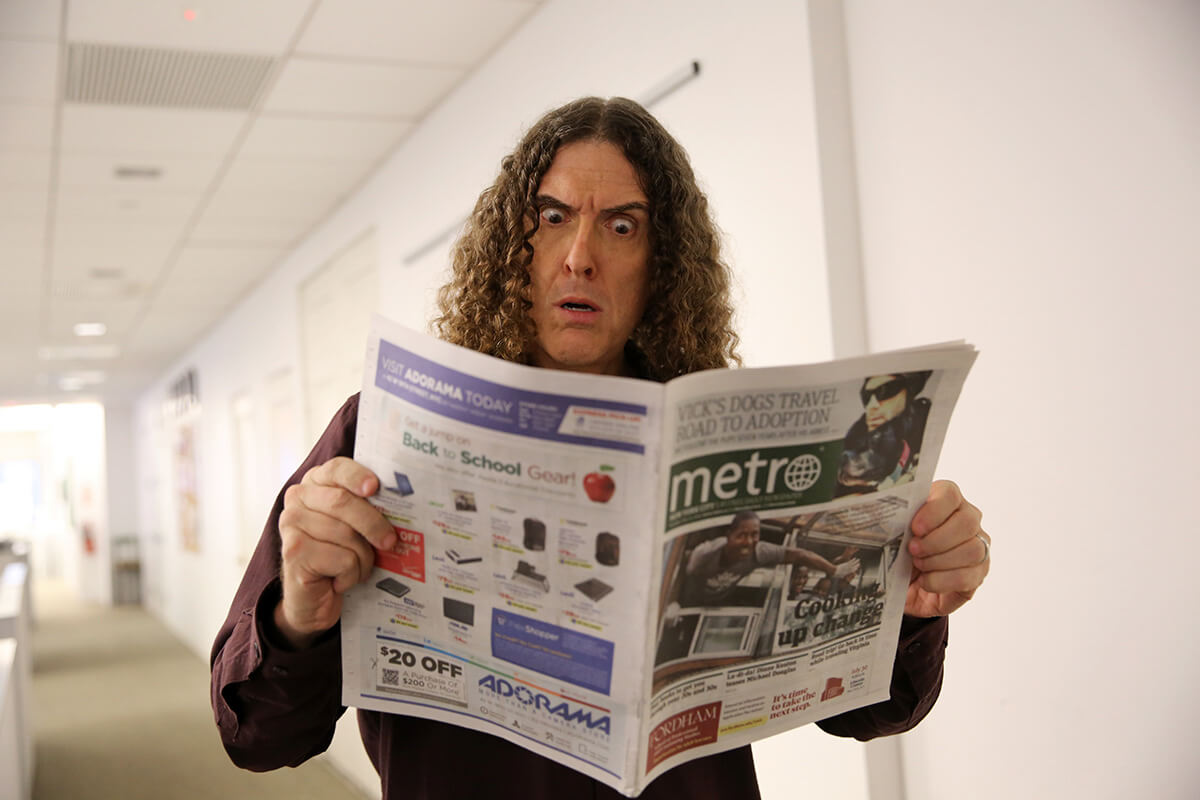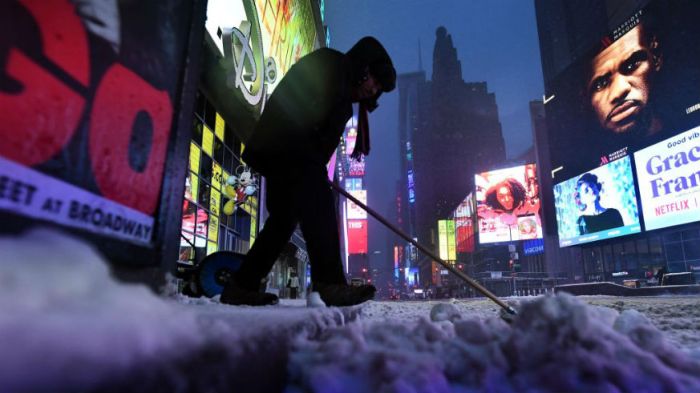In a career that has spanned more than 30 years, “Weird Al” Yankovic is still experiencing a lot of firsts.
After rolling out a video per day on various online outlets to promote his “Mandatory Fun” album this summer, the world’s most famous parody singer finally landed his first No. 1 record.
Each of the eight videos he released were viral sensations, racking up more than 50 million views and giving him a ubiquity that he hasn’t had since the 1980s. He’s hoping the announcement of a world tour will have a similar impact. “I always like to do the sneak attack,” Yankovic says of the #8Days8Videos campaign and today’s announcement of the Mandatory Tour, which includes two nights at the Wilbur Theatre in Boston (June 2nd and 3rd) and an appearance at the Governors Ball (on June 9th). “Because it’s comedy, surprise is a big component of that. It’s better not to know the joke is coming, and the more you can catch somebody off guard, the more effective it is.” This comic consciousness is a big part of our exclusive conversation with Yankovic.
When discussing “Word Crimes,” the “Blurred Lines” parody that has been viewed on YouTube more than 21 million times, he says, “If you’re going to be angry about grammar mistakes, why not be extremely angry about them?” And while Yankovic has said that “Mandatory Fun,” which was nominated for a Grammy last month, may be his last conventional album, it doesn’t mean he’s retiring from making fun of hit songs. He just might do it in a more timely fashion, releasing singles instead. So what other firsts await him in his career? “I’ve done a TV series and I’ve done a movie,” he says, adding, “Someday I’d like to do a successful TV series and a successful movie! The one thing I’m sort of toying around with is doing a Broadway play. I won’t say who I’m collaborating with or what we’re thinking about, but that’s something that’s [in] my thoughts lately, and something that I haven’t done. Other than that, I still enjoy my day job.” Pat Healy: So you’ve been doing this for more than 30 years, and you’re still experiencing new things. You’re now invited over to the couch on talk shows, you’ve finally got a No. 1 album! Weird Al: Life keeps changing. A lot of things have happened in the past two to three decades. Traditional media is still around, but it’s evolving, it’s changing. There’s ways that artists communicate with their public. When I started out in the ’80s I was beholden to radio and MTV, and that’s completely turned around. MTV doesn’t exist for my purposes anymore and radio, while still supportive to some extent, they’re not the driving force behind my marketing campaign anymore because, let’s face it, nobody’s going to be adding my songs to their rotation. I might get a few spins on morning radio shows, but that’s pretty much it. So the Internet is where my bread is buttered these days, so that’s why I focused all of my attention on the Internet, for release week. Tell me about the promotional campaign, with the whole notion of rolling out a different video each day.
It’s a little bit of art vs. commerce, because in the past, in the old traditional model, you wanted to have a single out a few weeks in advance of the album, to build some steam and get the MTV rotation and then the album comes out. And I find that really isn’t a consideration anymore, and as much as possible, I didn’t want anybody to hear anything from the album or know anything about the album until it was released, and then, hit ‘em with everything I’ve got. The list of titles came out like two weeks before, and stirred up a little buzz with people speculating what the songs were parodies of. But we didn’t actually put anything out until the day before, which is when the “Tacky” video came out. And then it was a video every single day, for eight days. I wanted release week to be an event. Because I was depending on the Internet, I kind of have a feel for how the Internet works, how things go viral for about a 24-hour period. That’s really the cycle: People get very excited about something when they discover it, they email it to their friends and then the next day it’s something new. I mean, if you share something with somebody that was a big hit two days ago, they’re like, “Why are you sending this to me?! That was two days ago!” Was that frustrating for you, as a creative personality, to have all of this intense funny material you’re working on, and get no feedback from your fans for so long? At least with previous releases you’d release the album, then you’d get some feedback, then you release a video, you get some more feedback, and then you release another video and you’re getting response all the while. I’m sort of used to working in a vacuum in that way. Previous releases were a bit more spread out, but I’m always doing comedy without an audience, in that sense. I’m writing things, I’m recording things, I’m shooting things which I’m always hoping are going to be funny to people. They’re funny to me. But you never know how people are going to react to it. The album was about two years in the making, off and on, and the videos as well. The stop-motion animation on the “Lame Claim to Fame” video, that alone I think was about a year and a half of a guy just sitting there and doing frame-by-frame animation. The video producers and I had been working on this over the course of a couple years. But we were just timing it so it could all be done at the same time, so we could just blow it out during that week.
How about the timing of the Iggy Azalea parody? That was a pretty quick turnaround, no?
It got to the point where I had 11 songs in the can and I was waiting for one more to finish the album. And I wasn’t even necessarily looking for a big hit to parody. In the traditional model I would always be waiting for the “big hit,” and it got me thinking that I didn’t need a “big hit” because there are several really strong things on this album already, and I’m blowing it all out in one week anyway, so there’s no suchthing as a “single,” per se anymore, because literally, any track on the album could be a single. They’re all going to be available digitally on iTunes, so if you hear a song that you want to buy and you don’t want to buy the rest of the album, then that’s your single. So I figured everything was changing and I wasn’t going to wait for a big single, but as it happened, right then was when the Song of the Summer, Iggy Azalea’s “Fancy” came out, and I thought, “Well, this completes the album very nicely, because then I’ll have a very fresh and current song.” My record label was nice enough to rush the album out as soon as humanly possible. And the album actually came out while “Fancy” was still No. 1 on the charts, which is actually a nice fete on their part. About 15 years ago there was an Onion story that was basically a send-up of how you work, and when you hear a hit, how you automatically think of how to turn it into an exacting parody and some sort of social commentary and that you’re really a self-serious artist. I’m guessing you saw the piece. How close is this to your actual methodology? Do you hear every song as a potential parody or are you able to enjoy hit songs without thinking about what you’d do to them? When I read that Onion piece, I was looking at that faux-notebook graphic and I was thinking, “ya know, this isn’t too far from reality.” [Laughs.] Some of those notes that they were scribbling in a notebook! But I certainly can listen to the radio, or listen to music in general, without always thinking, “Hmmm, how can I screw this one up?” I don’t always listen to music with that intent. I’m a big music fan, and that would just drive me crazy if I always had to have my antennae out. But when I’m actively trying to come up with parodies, basically I’ll just go through Billboard magazine, go through the charts, go on the Internet and I’ll make a list of all the songs which were big hits, which were mainstream successes, which I feel would be good candidates for parody, good targets. Then I’ll go down that list, think of every variation on a theme, every way I could tweak it and make it funny or take it in a different direction. I’m very analytical that way. Every once in a while I’ll have an idea that strikes me, and I’ll be spontaneous, but more often than not it’ll be me, sitting down, making long lists of things, and I’ll go through the lists and figure out which idea, out of everything on the list, I feel like I can make into a funny song. And sometimes “none of them” is the answer. I try not to force a song, even if a song feels like it’s a good target and I can’t think of a clever enough idea, I have to walk away. You mentioned how you have to know whether an idea is funny or not. When you’re in these beginning stages, are you actually cracking yourself up? Because by the time it gets to the listener it’s so perfected, and the musicians have figured out how to make it best sound like the original song. But I wonder about the raw idea. I don’t know that I literally LOL, but a little spark will go off in my brain and I’ll go, “Oh! I can make this work!” And I’m pretty good at determining whether or not something is going to fly, just in the conceptual stage, which is good because I don’t like wasted effort. I’m not like one of these songwriters that will write 100 songs and record 40 of them and then pick 12 for the album. That seems crazy to me. I basically narrowed it down to 12 ideas that I like and then I commit to those ideas and say, “OK, I’m writing a song about this!” I focus all of my energy on those 12 ideas, and that way, I don’t allow myself to say, “No, this isn’t working.” That happens to creative people 10 times every day: you oscillate between thinking you’re a genius and you’re a failure and you always want to quit, so I don’t give myself that option. We talked a little bit about your career, spanning more than three decades, and although you get older, for the most part, the people you parody has always been in their 20s. Think about all of the people you’ve parodied that are no longer with us. Michael Jackson is gone, Kurt Cobain is gone, but yet, you’re still a constant, still a benchmark of success for artists to say, “I’ve made it! Weird Al has parodied my song!” With all of these musical trends that have come and gone, I wonder if there have been any challenges for you, in trying to get the parody perfect with new types of music that come along. I mean, you started doing what you’re doing before rap and hip-hop even became a viable commodity. Rap is actually a fairly easy genre for me to parody, because there’s so many words. Sometimes there are pop songs that are too repetitive, that don’t give you enough syllables to work with, and that’s always a challenge, because it forces you to say, “OK, I need to have a joke in seven syllables.” With rap, there are plenty of words, and it give you a lot of freedom, so that’s one of the reasons why I really enjoy doing those kinds of parodies. The challenges really are those songs that don’t give you a lot to work with, in terms of words. It would be fun to do an EDM parody, but again, what do you do? And your musicians, you’ve been playing with them forever.
Yeah, I’ve had the same band since the early ’80s. I got very, very lucky, because they’re all insanely talented and they’re great down-to-earth guys on top of it. We get along, we have a great time on the road, there’s no drama and they kill it every single night. A lot has been made about the way that you have approached the people that you have parodied over the years, and how you seek actual permission before they even hear the tracks. I think it was Krist Novoselic of Nirvana who spoke about finding out that you’d be parodying them on the night they first did “Saturday Night Live,” and it was the double-whammy in realizing they had achieved some real status in their career. How has the general response changed over the years? Do all of the artists still accept the notion that this 55-year-old guy is going to make a high-profile parody of them? Well, it helps that I have a track record. I’ve been lucky, really, for the last couple of decades. I will say that when I first started out, in the early ’80s, it was difficult for my manager to get his phone calls returned, because nobody knew who this Weird Al guy was or what I was about and it was difficult, starting out. And I have to give a large amount of credit to Michael Jackson for allowing me to do my parody of “Beat It,” because when we approached him I had one album under my belt, but it didn’t perform that well. It certainly wasn’t any kind of a hit. The fact that Michael Jackson gave us any kind of response at all was pretty mind-boggling, but he actually approved “Eat It.” There is a contract, an actual legal document that exists in this universe, that has my signature right next to Michael Jackson’s signature saying that we are the co-writers of “Eat It.” And that turned a key in a major way, because all of a sudden we had that ammunition. We had the approval of the biggest artist in the known universe, so any artist that we’d been talking to who were waffling or were a little on the fence, we could go back to them and say, “Well, Michael Jackson didn’t seem to have a problem with it…” And they’d be like, “Oh! Well, Michael Jackson? Well, I guess in that case, you’re cool!” Do you develop any sort of relationships over time with these artists? You make the initial contact, and then does anybody ever say, “hey, remember when you did that great parody of one of my hit songs? Maybe you could do another parody of one of my new tracks? My sales are kind of falling off.” I don’t want to mention any names, but there have been a few times at social events, where an artist has come up to me and said, “When are you going to do one of my songs?” And I’m not sure if they’re making conversation or if they’re sincere, but that’s always nice to hear. What about long-lasting relationships though? Any weird tales of hanging out with somebody you’ve parodied?
More often than not I never meet the artist that I parody, and sometimes I actually become close friends with them, so it spans the whole range there, but I’d have to say, without exception they’ve been flattered and they’ve enjoyed the parody. How does it work with the money? I seem to recall an instance that Puff Daddy owed Sting more money for sampling “Every Breath You Take” because he didn’t actually ask permission before recording the song. That was a weird thing too because that wasn’t even Sting’s lick! That was Andy Summers’ lick!
But does getting permission mean a different percentage of royalties and is that why you feel so compelled to ask, no matter what?
I try to set the law aside, in a way, because I want to do what’s ethically right. I could get away with a lot more than I do, because the law rules in favor of parody artists. There’s precedence in place. It’s different than a sample. But I’ve always wanted to take the high road and respect the artist. I like to think that’s part of the reason I’ve been able to hang around in the business as long as I have. I try not to make enemies, I try not to step on anybody’s toes. And if an artist really does not want me to do a parody, I will back off, whether I have “legal” grounds to do it or not. So that’s just how I roll. I just don’t want the drama. I don’t want anybody to be upset with me, and part of that is that we work out the deals with them. We get the permission, my manager will talk to their “business” person, we’ll figure out a deal. It’s their music, so they should be getting a part of it. It’s my lyrics, so I should be getting a part of it. There is a boilerplate, but it’s sort of a negotiation every single time, and we’re always just trying to do right by them and hopefully they’re trying to do right by us. We’re at a moment in popular culture where it feels like music and comedy are more strongly linked than they ever have been before. Do you agree with that?
Certainly the most strongly linked than it’s been in quite some time. There was sort of a golden age of novelty music in the late ’50s and early ’60s, and then things kind of got very serious and there was a drought of musical comedy in the ’70s, and I’d like to think I helped bring it back, and now there’s a flourishing musical comedy scene. There’s the Lonely Island, Flight of the Conchords, Tenacious D, Reggie Watts, Garfunkel and Oates, Bo Burnham, Roy Zimmerman, I could go on and on about all of these people doing such great work, and it’s nice to be part of a community now. Do you feel they look to you as a forefather to all of this?
[Laughs.] I wouldn’t want to presume anything. You could ask them, I suppose. I’ve been doing it for a while, so I’d like to think that at some point I’ve inspired or influenced somebody.
In all of your career, what is the most serious song you’ve ever done? What work do you feel most represents you?
My drummer dug up an old recording that I did when I was like 13 or 14 years old, where it was really me trying to do an actual, serious song before I thought, “OK, I can do comedy music.” But oh man, it was the most embarrassing thing I’ve ever heard in my life. I mean, if that ever made it onto the Internet, that would be worse than a leaked nude picture. I couldn’t live with myself. It would almost be extra funny though, no?
Not to me!
Could you give me a sample lyric?
No, no! I’m not even going to give you anything! It was just me, being so earnest. It was just like, “Oh, this is the most horrific thing I’ve heard in my life!” But other than that, everything that I’ve put out has been comedic in some way. Some stuff is really overtly comedic, and some stuff if just quirky character pieces, like “Skipper Dan” or “Frank’s 2000” TV.” There are some songs that are just quirky, rather than straight-up comedic. But I can’t say there’s anything that I’ve released that is very serious. Which do you find more rewarding, the straight-up parody or the comedic song that has little to do with a preexisting song?
They’re both rewarding in different ways. I don’t think that I would ever give up doing one over the other. The parodies are fun to do: they’re a lot easier to do, because obviously, I’m not writing music, or having to do demos. There’s no real creative decisions to be made in the studio, like “should the bass be louder?” because it’s right there and it’s like, “we do it like that!” But didn’t Imagine Dragons actually help out with that part when you did “Inactive,” a send-up of their “Radioactive.”
Well, my band was having a really tough time matching the sound because they used a lot of samples, and those are not always easy to emulate, so my drummer and guitar player were sort of like, “if you have any ‘in’ with the band, we could use some hints!” So my drummer got a snare sample from the drummer, and I talked to the engineer, and he didn’t actually tell us how to do it — they’re very proprietary about it — but for the robotic voice I was like, “How do you do that?” and he was like, “Oh, send me your track and I’ll do it for you.” Is there anything in your career that you haven’t done that you want to?
Ya know, I’ve done a TV series and I’ve done a movie. Someday I’d like to do a successful TV series and a successful movie! The one thing I’m sort of toying around with is doing a Broadway play. I won’t say who I’m collaborating with or what we’re thinking about, but that’s something that’s entertaining my thoughts lately, and something that I haven’t done. Other than that, I still enjoy my day job. I still enjoy recording and touring and whenever a TV or feature project comes along that seems to share my sensibilities I’m always happy to do that.
‘Weird Al’ Yankovic announces the Mandatory Tour

Bess Adler


















